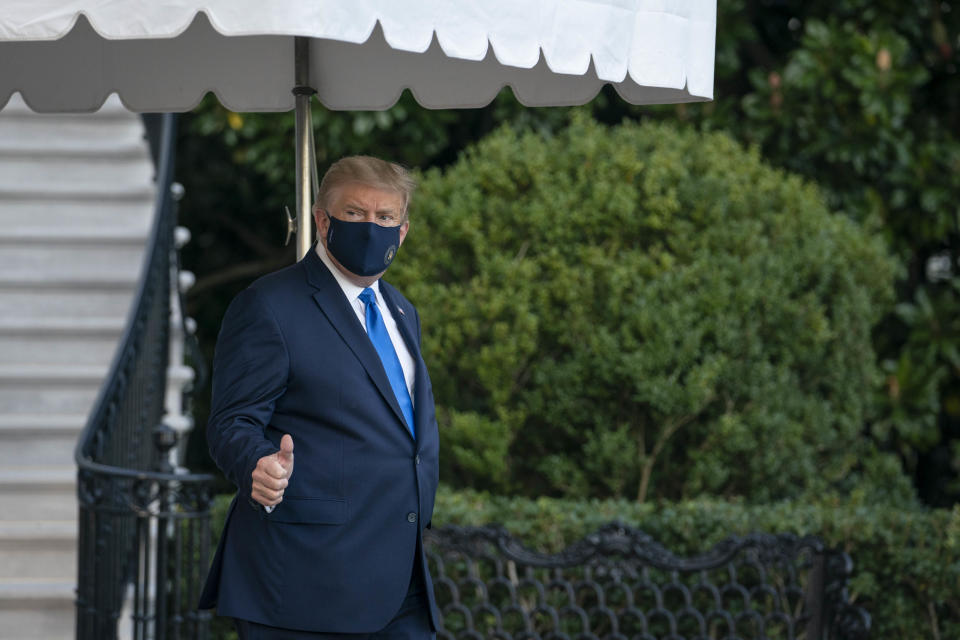With Trump hospitalized for COVID-19, experimental therapeutics show some promise

On Friday evening, the White House released more information about his treatment for COVID-19.
Shortly before President Trump headed to Walter Reed National Military Medical Center Trump’s physician said in a health update that the president received a single 8-gram dose of Regeneron’s polyclonal antibody cocktail “as a precautionary measure,” and that Trump has also been taking zinc, vitamin D, famotidine, melatonin and aspirin.
Late Friday night, Trump’s physician released another update, saying that the president “is not requiring any supplemental oxygen, but in consultation with specialists we have elected to initiate Remdesivir therapy. He has completed his first dose and is resting comfortably.”
Despite Trump frequently touting the use of hydroxychloroquine as a therapeutic and being given a course of the antimalarial drug in May as a prophylaxis against COVID-19, it was notably absent from the list of treatments currently being given to the president. The FDA revoked its emergency-use authorization of hydroxychloroquine in June, citing the drug’s “known and potential risks.”
“I think based on the data that we have so far for hydroxychloroquine that it would be quite unwise for his doctors to give him that medication,” Dr. Uché Blackstock, a Yahoo News medical contributor and CEO of Advancing Health Equity, said earlier Friday afternoon. “We know that it has very serious side effects, and the data is not convincing in support of taking that medication for COVID-19.”
White House press secretary Kayleigh McEnany said in a statement Friday evening that although Trump has “mild symptoms” of COVID-19, he would remain at Walter Reed for a few days.

While there is currently no cure for COVID-19, Blackstock said there are several therapeutics available that Trump’s medical team could utilize if his condition worsens. One such therapeutic is remdesivir — a medication that received emergency use authorization from the FDA on May 1 and was shown to decrease hospitalization time in people who were admitted with coronavirus complications.
Another potential treatment is dexamethasone — a steroid that Blackstock says has been shown to decrease mortality rates in people who require supplemental oxygen or have to be placed on a mechanical ventilator to help with their breathing.
Convalescent plasma — which involves using the antibodies found in plasma of recovered COVID-19 patients to help boost the immune response of hospitalized patients — may be another therapy Trump’s medical team considers. The FDA authorized emergency use of convalescent plasma in August, though its effectiveness in COVID-19 patients is still being studied.
“The [jury] is still out,” Blackstock said of convalescent plasma. “It’s not convincing evidence for its use, but that may be something that the president’s staff considers.”
Trump’s position as commander in chief may also grant him access to treatments that aren’t yet available to the general public.
“There are other experimental medications out there, like monoclonal antibodies and other immunomodulators, that are currently being studied that he may have access to because he’s the president,” Blackstock explained.
“It could be that he has relationships to pharmaceutical companies that may say, ‘Hey, we have this medication, it’s showing some promising effects although it hasn’t passed through all the different phases of clinical trials that you may want to try.’” Blackstock said. “Given his stature as president, he would have access to those therapeutics while the average American would not.”
As of September, Regeneron’s antibody cocktail was in phase III trials and showing promising results. The drug seemed to reduce levels of the virus and improve symptoms, with the greatest improvements seen in patients who hadn’t already mounted a natural response. Regeneron’s product hasn’t been authorized for emergency use by the FDA, but Dr. Leonard Schleifer, the company’s chief executive who has known Mr. Trump casually for years, told the New York Times that patients are granted access to the experimental treatment outside of clinical trials on a case-by-case basis, and that Trump is not the first patient to be granted permission this way. Companies can grant access to therapeutics still in clinical trials if, for example, all other options have failed and a patient may die.
“When it’s the president of the United States, of course, that gets — obviously — our attention,” Schleifer said.
_____
Read more from Yahoo News:


